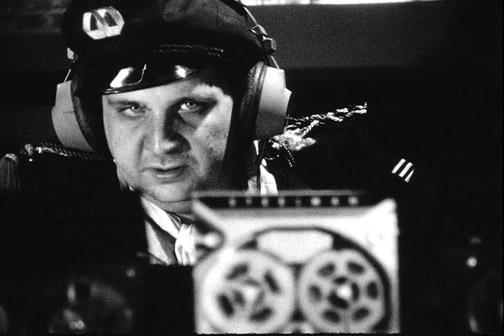Since the ’70s, Bay Area filmmaker Craig Baldwin has been piecing together 16mm snippets of found footage and creating cinematic collages dealing with topics such as imperialism, copyright law and the paranormal. Baldwin’s efforts function as an affront to what he calls “rarefied, hushed art” and—in favor of creating a horizontal exchange rather than a hierarchy—attempt to demystify art that takes itself seriously. Six years ago, Baldwin helped establish Other Cinema Digital (OCD), a niche DVD label housing 21 titles. OCD seeks to promote media archaeology and broaden the imprint of underground film. As the culmination of the monthlong Other Cinema festival at Guild Cinema, Baldwin will make three appearances at the indie art house theater. Baldwin will accompany screenings of his latest feature, Mock Up on Mu , which explores the alternative history of “post-war” Southern California. The film is crawling with sex magic, spiritual hierarchies, devil worshipping and aerospace gone wrong. Before his visit, the Alibi got Baldwin on the horn to talk about saucers and rockets. You’ve defined your work as underground rather than experimental or avant-garde. Why? I don’t take any of [these terms] too seriously, and I don’t discount them either, but “experimental” is OK. “Avant-garde” has a connotation of something that’s more elite, a kind of precious experience, which is fine. Some of my best friends are avant-garde artists. [ Laughs. ] I’m part of that world, that’s for sure, but most of the work I produce is more lowbrow in a way. It’s more exploitation or trashy—“sub pop” is a better word for it. “Underground” connotes this idea of a sensibility, a lifestyle, a point of view. It’s really expressing an alternative, adversarial or oppositional sensibility—more of a moral or ethical alternative rather than just a formalistic alternative. Your films have been called ephemeral. Is part of what you do an attempt to save film that might otherwise be lost? For sure, you got it exactly. Sometimes we have shows that are just industrial [films] amok—sometimes they’re called “perfect films.” In other words, they’re films that are not cut up. We just present them as is, like a found object. And they’re marvelous in their presence, which is a trace of an earlier period. They’re like little time capsules. So, yes, we’re very much into not only showing those films but also publishing those films. We have a disc called The 70s Dimension . This was, believe it or not, found in a dumpster—commercials and PSAs from the ’70s. They’re just perfect because they sum up this whole period: the hairstyles, the gestures, the gender roles, the clothing, the cars, all those things. And the B side is films that cut up the same kind of material. That, for me, is the best of both worlds. Why are you so drawn to conspiracies? To me it’s more of a way of thinking. It has something to do with fear in terms of the mode of paranoia that’s very much a part of our age. People have learned that maybe it’s useful to be paranoid; it may not be wrong. On the cinematic level, conspiracy theory adds a layer of suspense to the tone of the film. This idea of fantasy is sort of interesting to me because I don’t like the sober and sterile. I like this delirious skepticism about what is and isn’t true. I would like to play with the hypothetical possibility that, OK, there are saucers, and let’s just see how this plays out. Not as an ends to itself to prove or disprove saucers, but as a means to make another point about real military technology, for example, which is more grotesque and pernicious than flying saucers. So I would use them as a way of establishing a critique so it doesn’t become a moral, hand-wringing, guilt-ridden kind of thing. [Documentaries] are great, by the way, but I’m not interested in making them. What I’d rather do is make a film that goes beyond the evil of the military and into some other world, a grotesque fantasy world. What’s the main goal of your film work? I’m a little bit more of an activist. Maybe I’m full of myself, but I really want to educate. But not through the official means. I’m telling you stories in a bent way, and hopefully it opens up the possibilities of film language and the human imagination. That all sounds too corny and self-important, but, really, it’s what drives me, this way of opening up other spaces. The writing of alternative histories, that’s the real goal.
Craig Baldwin will make three live appearances accompanying screenings of Mock Up on Mu as part of Guild Cinema’s Other Cinema Blowout. The screenings are at 8:30 p.m. on April 13, 14 and 15. Admission is $8. Ticket price includes a double-featured film prior to the “ Mu -vie.” (Opening films and times change each day.) See the Alibi film capsules and film times for more information, or go to guildcinema.com.




